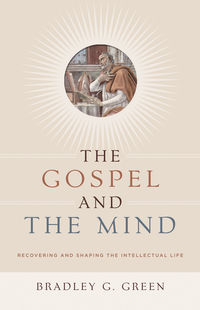
Bradley G. Green
Reviewed by: Joel Pearce
The Gospel and the Mind: Recovering and Shaping the Intellectual Life, by Bradley G. Green. Published by Crossway, 2010. Paperback, 192 pages, list price $16.99. Reviewed by Joel Pearce, a graduate student and member of Covenant Reformed Church in New Holland, Pa.
In an age of anti-intellectualism, scientism, and mind-numbing electronic media, how are Christians to live, learn, and glorify God? In The Gospel and the Mind: Recovering and Shaping the Intellectual Life, Bradley G. Green explores the connections between the Christian gospel and the pursuit of knowledge. Driven by the perception that "wherever the gospel goes, it seems to generate intellectual deliberation and inquiry," Green has written a persuasive defense of the Christian intellectual life as the best context from which to study the world.
Christ died to redeem all of who we are, including our minds. Thus, "any sort of meaningful intellectual life will be rooted in Christ and the gospel" (p. 178). To flesh this out, Green examines five themes relevant to the pursuit of knowledge: the realities of creation and history, the telos [end, purpose] of history, the cross of Christ, the nature of language, and knowledge and morality. His thesis is twofold: "The Christian vision of God, man, and the world provides the necessary precondition of the recovery of any meaningful intellectual life; and the Christian vision of God, man, and the world offers a particular, unique understanding of what the intellectual life might look like" (pp. 13–14). Green leans heavily on Calvin, Aquinas, Athanasius, and especially Augustine to respond to Derrida, Nietzsche, Saussure, and others. In the process, he shows how modern and postmodern thinkers have removed hope by rejecting the telos of history, while uncovering the destructive influence of sin on the mind.
Green expounds on Calvin's conviction that to know God is to honor God, and that "the honoring is included within the knowledge itself" (p. 150). From Calvin, Green discusses the moral nature of knowledge, supported by the Psalms, Proverbs, and Paul. His conclusion, drawn from Calvin, C. S. Lewis, and Cornelius Van Til, is that all knowledge is more than just facts; it is personal, moral, and laden with responsibility. This responsibility is to know things truly, as they are known by God. We cannot know as God knows, but we can know in light of who God is and what he has spoken. This is how, as Kepler wrote, we are able to think God's thoughts after him. Since "God has revealed himself to all persons in the created order, then all persons know God and are engaged in the moral, willful, ethical submission to or rejection of the God of Holy Scripture at virtually all moments of their existence" (pp. 161–62).
The gospel enters this discussion in that, when our hearts and minds have been renewed by the Holy Spirit, our moral will and our natural loves will also change. Following the apostle Paul and Augustine, Green argues that we cannot truly know what we do not love. Thus, "God is to be loved, while all other things are to be viewed in relation to that ultimate love" (pp. 166–67). Because we serve a good, personal, and rational God, knowledge is good. This lies at the foundation of a truly Christian understanding of the life of the mind. Therefore, a full Christian worldview "encourages attention to the world, its structures, and its mysteries" (p. 179).
June 15, 2025
June 08, 2025
June 01, 2025
Anxiety: Finding the Better Story
May 25, 2025
April 27, 2025
The Devoted Mind: Seeking God’s Face in a World of Distraction
April 20, 2025
April 13, 2025
© 2025 The Orthodox Presbyterian Church